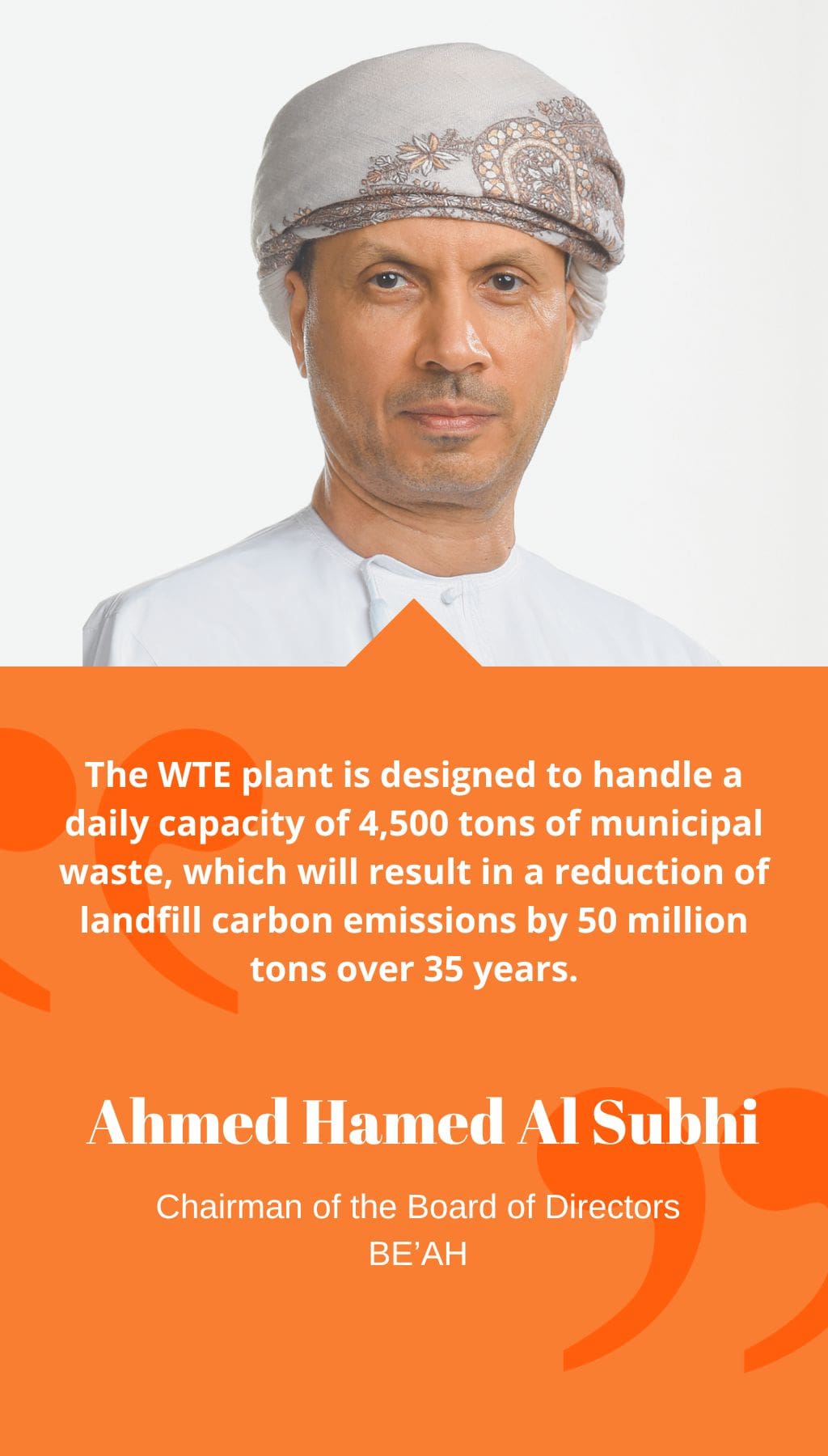
- Oman | 23 April 2021

Can you tell us about the evolution of be’ah since its establishment in 2007 and its main highlights?
Since its establishment in 2007, be’ah has undergone a remarkable transformation and has become a highly capable service provider for national waste management strategies in Oman. Over the years, be’ah has expanded its operations and acquired additional assets. In 2012, the company launched its first treatment facility, followed by the introduction of municipal solid waste (MSW) services in 2015 and industrial waste landfill operations in 2019. By 2020, be’ah achieved 100% MSW coverage in Oman, a significant milestone.
Furthermore, be’ah has identified and implemented various core strategies aligned with the government’s vision for waste management. In 2021, the company signed strategic agreements to advance its circular economy goals. Notably, be’ah made significant progress in recycling by collaborating with key stakeholders to support local recyclers. The company also provided support for two local businesses to establish used cooking oil recycling operations that produce biofuel. Additionally, be’ah offered technical and logistical assistance to paper recycling units.
Could you provide more details about the Memorandum of Understanding (MoU) between be’ah and the Oman Power and Water Procurement Company (OPWP) for the construction of a waste-to-energy (WTE) plant in Barka?
The MoU between be’ah and OPWP to build a waste-to-energy (WTE) plant in Barka is a significant project aligned with Oman Vision 2040. This initiative aims to achieve economic development and environmental sustainability goals outlined in the vision. The construction of the WTE plant supports Oman’s energy diversification objectives and the transition to renewable energy sources.
The project has multiple benefits. It contributes to economic growth by creating investment opportunities in the environmental sector and generating direct and indirect employment with SMEs and service providers. It aligns with be’ah’s efforts to reduce landfill usage across the country, provide long-term waste management solutions, and reduce greenhouse gas emissions. The WTE plant is designed to handle a daily capacity of 4,500 tons of municipal waste, which will result in a reduction of landfill carbon emissions by 50 million tons over 35 years (equivalent to 1.3 million tons per year). This reduction accounts for 30% of the total carbon dioxide equivalent emitted by landfill operations. Additionally, the plant will contribute to a diversified energy sector by supplying 130-150MW from renewable sources. This substantial reduction in carbon emissions supports Oman’s commitments under the Paris Agreement. Furthermore, involving the private sector in the construction and operation of the WTE plant promotes collaboration between two critical sectors with a shared goal of long-term sustainability. Overall, this partnership between be’ah and OPWP is a significant step toward integrating sustainable environmental practices into Oman’s energy industry.
In addition to the agreement with OPWP, be’ah has signed several cooperation agreements with PDO to promote environmental sustainability. Which other sectors in the Omani economy require waste management solutions?
Alongside the partnership with PDO, be’ah recognizes the increasing demand for waste management services in various sectors of the Omani economy. One sector that has experienced a rise in demand is healthcare. The challenges posed by COVID-19 have led to an increase in healthcare waste generation. In response, be’ah has supported the operations of two healthcare waste treatment facilities in Al Multaqa and Thumrait, and is currently building a third facility in Liwa. The company has implemented operational measures such as providing additional disposable biohazard bins for laboratories and vaccination centers, as well as introducing flexible healthcare waste collection schedules and enhanced operational procedures.
Another sector that requires effective waste management solutions is industrial waste. With Oman’s expanding industrial base, the volume of industrial waste has significantly increased. be’ah has proactively responded to this demand by ensuring sustainable industrial waste management to protect Oman’s environment and ecosystems. The company has collaborated with leading sustainability and environmental organizations globally to introduce best practices. be’ah has strengthened its operations in the industrial waste treatment facility in Sohar, the industrial waste handling facility in Duqm, and the temporary industrial waste storage facility in Liwa. Furthermore, be’ah has expanded its management services to cover other special waste streams, including construction and demolition waste and end-of-life tires. The company has established partnerships with a wider network of contractors and service providers and enhanced its infrastructure across the country, ensuring sustainable solutions are at the core of its operations.














